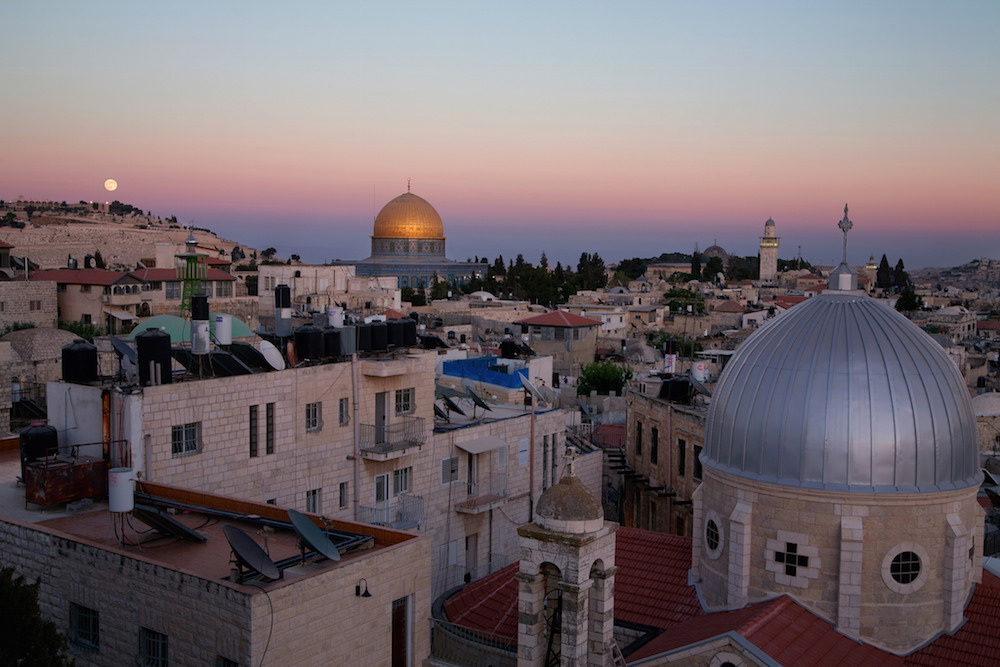Giro d'Italia staying out of Jerusalem's Old City to avoid 'risky narrow roads' rather than political controversy
Old City, regarded by UN as occupied Palestinian territory, will not feature in Giro d'Italia route

The latest race content, interviews, features, reviews and expert buying guides, direct to your inbox!
You are now subscribed
Your newsletter sign-up was successful
The route of the opening stage of the Giro d'Italia will avoid the disputed Old City of Jerusalem for sporting reasons, rather than the desire to avoid political controversy, according to a key figure in attracting the race outside of Europe for the first time.
Amir Halevi, Director General of Israel Tourism, said that local authorities had played no part in deciding the route of stage one's time trial, with the decision not to go into the Old City - part of East Jerusalem, which is regarded by the United Nations as occupied Palestinian territory - made by Giro organisers RCS Sport for the safety of the riders.
>>> Giro d'Italia 2018 route: Two time trial and Monte Zoncolan summit finish for 2018 race
"The Giro organisers decided where the race would go, and decided not to go into the Old City," Halevi said. "The Jerusalem Marathon goes into the Old City, but for the professional cyclists to ride inside would be too risky because the roads are really narrow and there are lots of walls.
"We agreed that they would choose the locations of everything and that's what they did. We were happy that they decided to have the race outside the Old City."
The opening stage of the Giro d'Italia will start and finish just metres from the border between West and East Jerusalem, with the 10.1km course only taking in the Jewish neighbourhoods in the west of the city.

The route will largely take place on wide boulevards and dual carriageways, rather than the narrow streets of the Old City. In the past the Giro has used similar narrow streets for time trials, such as the start of stage 10 of the 2017 race in the ancient town of Foligno.
The latest race content, interviews, features, reviews and expert buying guides, direct to your inbox!
The Giro's visit to Jerusalem has been criticised by human rights groups who have called for the start to be cancelled, saying that the race is "whitewashing Israel’s military occupation and grave human rights violations", and criticising the use of images of the Old City in promotional material.
The Old City is under the control of the Israeli government, which regards Jerusalem as its national capital (indeed the Giro's route will run close to the parliament building), but is regarded as occupied Palestinian territory by the United Nations and much of the international community.
Watch: Is the race leader's skinsuit a disadvantage?
The second and third stages of the Giro d'Italia will also take place in Israel, also steering clear of political controversy by staying within the internationally-recognised borders that were in place prior to the Six-Day War in 1967.
For Halevi, the first of these will be a chance to show off the holy places in the north of country and finish in seaside city of Tel Aviv, while the third stage will travel through the desert south of the country before a finish another seaside town, Eilat, on the Red Sea.
Israeli officials hope that success at the Giro will attract more cyclists and races to the area, with Halevi having plenty more areas that he believes will be perfect for racing.
"More races will come after the Giro. Hopefully the year after more races will come," Halevi continued.
"This year we missed out the Sea of Galilee and all the views around it, as well as the north and more holy places. Next time they will do that.
"There is also route 90 from the Mount Hermon ski resort in the north, past the Sea of Galilee and the Dead Sea, and through the desert. That's 600km that they can do from north to south."
>>> Chris Froome to race the Giro d'Italia in 2018, say sources
For a country with little traditional cycling heritage, there may be concerns that the Grande Partenza may see a lack of roadside crowds as has been the case with races in China and elsewhere in the Middle East. However Halevi is confident that Israeli's general enthusiasm for sports will see them turn out to support the race.
"This is the biggest sporting event that Israel has ever hosted. Some people in Israel are religious, but for others the religion is sport. That's why we want to support more sporting events in Israel.
"We have a lot of experience with sports events and that's why I'm sure that the Israelis will be wonderful partners and will cheer the race. The people are ready for it. I don't think the crowds will be any problem."
The Giro d'Italia will get underway in Jerusalem on May 4, spending three days in Israel before a rest day transfer across the Mediterranean, with the race expected to restart on the island of Sicily on May 8.
The full route will be announced on Wednesday, November 29.
Henry Robertshaw began his time at Cycling Weekly working with the tech team, writing reviews, buying guides and appearing in videos advising on how to dress for the seasons. He later moved over to the news team, where his work focused on the professional peloton as well as legislation and provision for cycling. He's since moved his career in a new direction, with a role at the Department for Environment, Food and Rural Affairs.